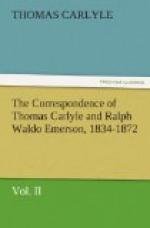Dear Emerson...... You are a born enthusiast, as quiet as you are; and it will continue so, at intervals, to the end. I admire your sly low-voiced sarcasm too;—in short, I love the sternly-gentle close-buttoned man very well, as I have always done, and intend to continue doing!—Pray observe therefore, and lay it to heart as a practical fact, that you are bound to persevere in writing to me from time to time; and will never get it given up, how sulky soever you grow, while we both remain in this world. Do not I very well understand all that you say about “apathized moods,” &c.? The gloom of approaching old age (approaching, nay arriving with some of us) is very considerable upon a man; and on the whole one contrives to take the very ugliest view, now and then, of all beautifulest things; and to shut one’s lips with a kind of grim defiance, a kind of imperial sorrow which is almost like felicity,—so completely and composedly wretched, one is equal to the very gods! These too are necessary, moods to a man. But the Earth withal is verdant, sun-beshone; and the Son of Adam has his place on it, and his tasks and recompenses in it, to the close;—as one remembers by and by, too. On the whole, I am infinitely solitary; but not more heavy laden than I have all along been, perhaps rather less so; I could fancy even old age to be beautiful, and to have a real divineness: for the rest, I say always, I cannot part with you, however it go; and so, in brief, you must get into the way of holding yourself obliged as formerly to a kind of dialogue with me; and speak, on paper since not otherwise, the oftenest you can. Let that be a point settled.
I am not writing on Frederic the Great; nor at all practically contemplating to do so. But, being in a reading mood after those furious Pamphlets (which have procured me showers of abuse from all the extensive genus Stupid in this country, and not done me any other mischief, but perhaps good), and not being capable of reading except in a train and about some object of interest to me,—I took to reading, near a year ago, about Frederick, as I had twice in my life done before; and have, in a loose way, tumbled up an immense quantity of shot rubbish on that field, and still continue. Not with much decisive approach to Frederick’s self, I am still afraid! The man looks brilliant and noble to me; but how love him, or the sad wreck he lived and worked in? I do not even yet see him clearly; and to try making others see him—?—Yet Voltaire and he are the celestial element of the poor Eighteenth Century; poor souls. I confess also to a real love for Frederick’s dumb followers: the Prussian Soldiery.—I often say to myself, “Were not here the real priests and virtuous martyrs of that loud-babbling rotten generation!” And so it goes on; when to end, or in what to end, God knows.
Adieu, dear Emerson. A blockhead (by mistake) has been let in, and has consumed all my time. Good be ever with you and yours.




